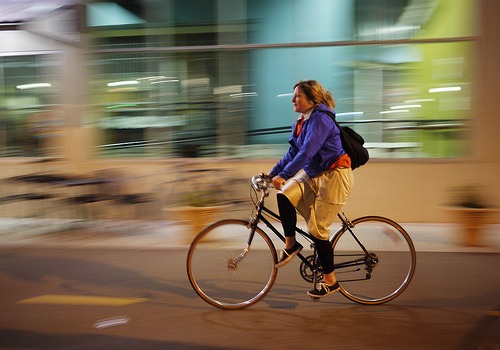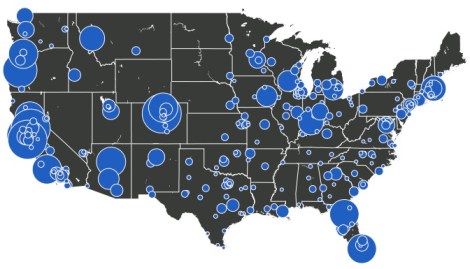More than three-quarters of a million Americans are regularly biking to work, according to new Census data. This map shows cycle commuting hotspots.
Davis, Calif., tops the charts with 16.6 percent of the city’s workforce peddling to punch the clock. West Coast cities, especially dense college towns with little public transit in California, Colorado, and Oregon, round out the top. But large metro areas, from Seattle to New York City, saw the biggest increases in cyclers since 2006. (Meanwhile, the East Coast and South are totally kicking ass on walking to work.)
Overall, there’s been a 47 percent increase in bike commuting since 2000.
From the Governing blog, which compiled and visualized the data:
In most areas, cyclists accounted for only a small share of all commuters. Last year, they made up an estimated 0.56 percent of U.S. working adults, a rate that has remained relatively stable in recent years. Cyclists accounted for 0.53 percent of commuters in 2010 and 0.55 percent in 2009, according to the survey.
Some urban areas, though, are home to far greater numbers of cyclists than others. More than 5 percent of working adults reported biking to work in at least sixteen cities surveyed with populations exceeding 65,000.
This new data comes from the Census Bureau’s small 2011 American Community Survey. Despite its high margins of error, it’s the best national data on biking we’ve got. (The League of American Bicyclists lays out the ACS statistical caveats in full.)
So, what to do to bump those numbers up even more? Changing the gender ratio of cyclists might be a start. As it stands, a small minority of bikers are women — they’re outnumbered more than 2-to-1 by men, according to the new ACS data.
Genevieve Walker at Atlantic Cities has some, uh, interesting/horrifying suggestions about drawing in women with shopping — “good clothing options” and “a hot guy standing behind the counter.” Alex Baca at Atlantic Cities smacks Walker down with evidence that women don’t want clothes, they want safe environments.
As the ACS data shows, all cyclists thrive in environments like Davis and Santa Barbara, where bike paths dominate large parts of the community, away from traffic-clogged roads.
Women, who tend to have more safety concerns than men, will be more likely to ride to work not when they have the cutest bike shorts, but when they’re likely to avoid not-so-cute traumatic brain injuries via SUV.





